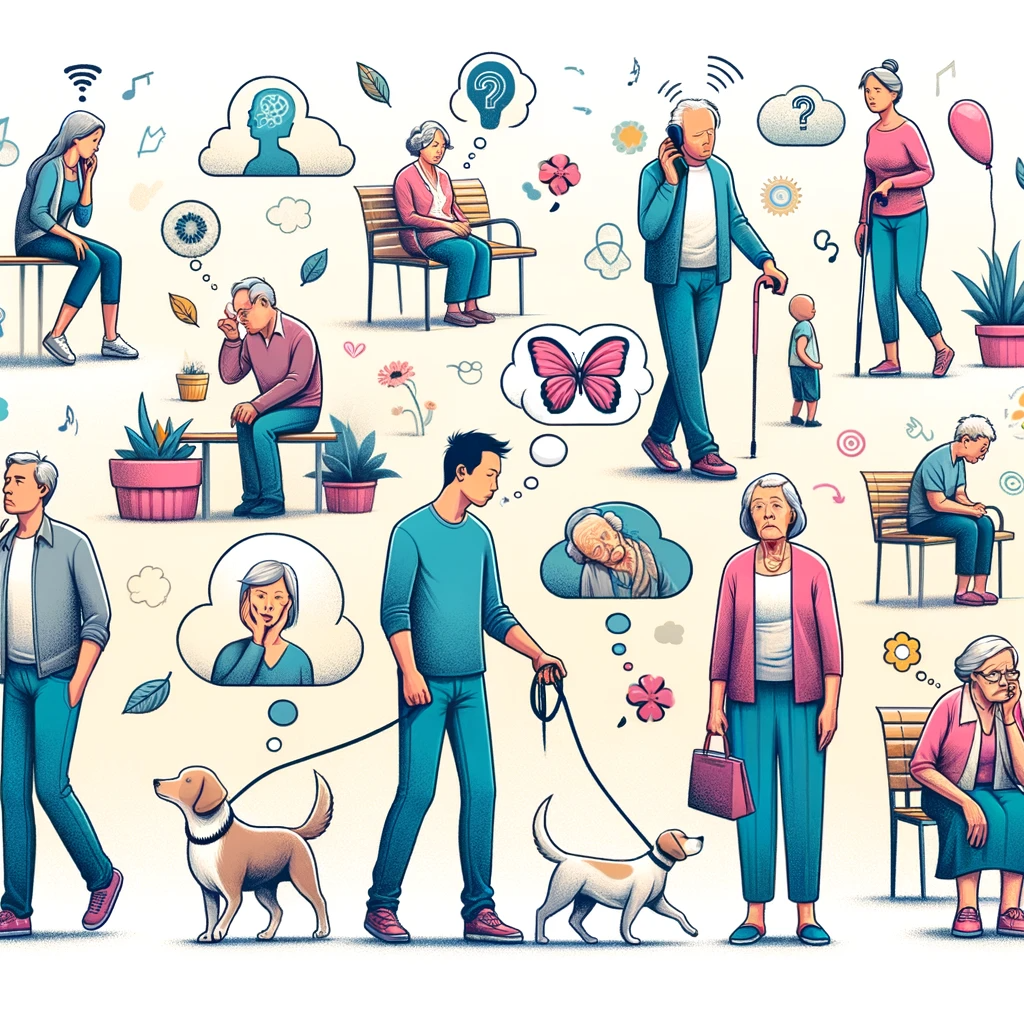Why Can't I Remember Things? Are Memory Lapses Normal?
Memory is an intricate process that works differently for everyone. If you are a person experiencing a memory problem, it's nothing to be ashamed of. Normal aging may cause fuzzy memories, but, dementia is not a normal part of the aging process.

Memory is an intricate process that works differently for everyone. If you are a person experiencing a memory problem, it's nothing to be ashamed of. Science hasn't found a definitive answer yet as to why this happens! Whether someone memory lapses and has difficulty with remembering yesterday or the events from their childhood, they're not alone
Normal aging may cause fuzzy memories, but, dementia is not a normal part of the aging process.
Research shows many people have difficulty storing and recalling information accurately over long periods of time. Despite these challenges though, we are gradually learning more about our brain's' inner workings in order to better understand memory disorders and how we can improve them moving forward.
What's Normal Aging and When is it Dementia?

Forgetting things can be a normal, natural part of life. For instance, if you just met someone while walking your dog, and learned their name--you're more likely to forget it soon after because those new memories haven't had time yet to "take root" in your mind. Of course, I am notorious for remembering the dogs name and forgetting the owners names.
You may also find yourself forgetting where you left something or are challenged to remember appointments that was on your agenda; this usually happens when we simply weren't paying attention properly due to being distracted by other thoughts, such as what's for dinner later? It’s not uncommon either to experience memory loss during times when our body is tired from working hard or stressed out over upcoming events - so don't worry too much!
The hazards of multitasking
Multitasking is a mental health hazard as well as a medical hazard.
Multitasking may not be all it's cracked up to be. New research indicates that multitaskers are more prone to making mistakes, misinterpreting information and cues, having weaker working memory retention - which could inhibit creativity and problem solving skills – as well as a host of other potential negative consequences.
Struggling to juggle multiple tasks and feeling like you're not doing any of them well? Try set shifting: intentional, full-focus attention on a single task. This brain fitness exercise helps you be more creative while making fewer mistakes or overlooking important details - it's the smart way to get stuff done!

Are you looking to boost your memory?
Lifestyles can have a significant impact on how well we remember. Harvard research has found that individuals who consume less saturated fat, which is common in meat and dairy products, had better results with memory tests than those eating more of these fats.
One way to make healthier food choices for the sake of improved ability to think and memory recall is by following the Mediterranean diet - filled with omega-3 fatty fish like salmon, heart healthy olive oil as an alternative cooking ingredient along side plenty of fresh vegetables will both nourish your body while you memory and other thinking skills ! If you are not a fish eater make sure to take dietary supplements to get the proper nutrients your brain needs.
High blood pressure, cholesterol and sugar levels all negatively affect the brain's ability to recall information and can cause a serious memory problem. Eliminating fatty foods from your diet is an important step in improving cognitive functioning. Additionally, smoking or drinking more than two drinks per day (for men) or one drink a day (for women) could be hazardous for remembering things properly too!
Exercise also plays a major part in promoting increased blood flow around our brains so get out there and start working on improving that memory today!
Moderate levels of aerobic exercise are recommended. Not everyone has the physical ability to get the recommended 30 minutes a day of exercise at one time. No worries. Studies have proven that exercising in three 10 minute increments has the same benefits of doing it at one time.
Normal aging and memory
Your memory can become less reliable due to natural changes in brain cells and the chemicals that support them. By the time you reach middle-age or beyond, it's normal for memories not to be as clear as when we were younger. Don't worry if yours isn't quite like it used to be!
This means that as you pass through your twenties, thirties and beyond not only may you find it harder to remember, but even when paying attention they're more quickly forgotten. If you are having difficulty concentrating don't worry; many are in the same boat! To help combat these normal aging changes and improve memory by actively focusing what is happening around us. Practice mindfulness and live in the here and now to avoid memory loss.
Are you worried about experiencing mild forgetfulness ? Normal forgetfulness does not always mean you are developing Alzheimer's disease or another type of dementia. It could instead arise from many causes.
What may cause forgetfulness?
It might be due to certain medications, lack of nutrients in your diet or a side effect of a medical condition. For example depression, thyroid disease , substance abuse and head injury may contribute to memory problems Visiting your primary care physician for some professional medical advice may avoid trouble of a medical emergency.
If often unable to remember normal activities such as where you parked that day or managing finances this may suggest something more serious. Likewise if a family member observes personality changes other thinking problems like confusion around familiar faces they should not go unnoticed. Of course anyone with concerns regarding their health can approach a physician and get checked out today!
Remembering complex routes or past events become easier once practiced regularly. That is why it is important to do something new and different everyday. We get very comfortable in our daily life with routines. The best thing you can do to improve memory and overcome forgetfulness is to learn a new skill. Make it part of your alzheimer's disease dementia prevention program.
Sleep problems impact your memory

Sleep problems can have serious consequences beyond just feeling tired, including an inability to effectively process and store information. For every 1.5 hours not spent sleeping each night, daytime alertness is reduced by 32%.
While caffeine may seem like a tempting solution for those struggling with fatigue during the day time caused by insufficient rest at night; it actually only serves as temporary relief that worsens problems in the long run .
Poor nutrition due to low stomach acidity or malabsorption issues has been linked directly to diminished memory abilities – particularly from vitamin B12 deficiencies - making this even more important for the aging family members than their younger counterparts.
Do you often struggle with forgetfulness, difficulty concentrating, having difficulty finding the desired words? or poor judgment ? Have you been under a lot of stress recently or engaging in unhealthy habits like excessive alcohol consumption, poor dieting, etc.? Are you losing things? Do you stay socially active or do you feel a to withdraw from others?
The stress and memory problems connection
If so it may be wise to investigate why you are having memory problems. Research studies link chronic high-stress levels being linked with memory impairment in mice studies; research also suggests an overgrowth of Candida (a type of yeast) as triggered by these same lifestyle factors – could also explain many cases of short term memory loss. To avoid any further cognitive impairment pay attention to causes - especially those connected with poor judgment of lifestyle choices.
Another cause to memory problems is autoimmune diseases.
An autoimmune disease can cause issues with learning, memory and cognition. Common ailments that may lead to these problems are Hashimoto's thyroiditis, Grave's Disease, Sjogren’s Syndrome or Lupus.
Gluten intolerance is also linked to memory problems; gluten found in wheat, barley and rye as a protein which some people struggle digesting leading potential indigestion flatulence & digestive irregularities. Going further, if you eat gluten and have gluten intolerance it could even act like an opiate for your brain by affecting cognitive function such as behavior & sensory processing, causing memory lapses.
If you are struggling with memory issues, it may be an early warning sign of mild cognitive impairment of other memory disorders. You have the power to take steps in order to sharpen your mind and avoid the trouble coming with memory problems.
National institutes of health recommend to start by reducing environmental toxins that can be detrimental for your neurological health and increasing foods rich in antioxidants, omega-3 fatty acids (like apples, coffee, blackberries etc.) With a healthy diet plus some savvy lifestyle changes you are sure to see an improvement in your memory and other thinking skills.
To help support your memory and brain health, embrace a balanced diet featuring whole foods such as fruits and vegetables. Get active by exercising regularly—this will boost blood flow to the brain while also giving it power to create new memories or link emotions with navigation, other recollections, and spatial awareness. If you find that your dietary needs are not being met sufficiently, consider taking supplements containing Ginkgo biloba (a medicinal herb), huperzine A extract for better absorption of nutrients in cells; vinpocetine helps improve alertness levels too!
If your memory loss is creating difficulties in everyday life, it may be time to seek help. An inability to remember recent events or find the way home could signal a condition that requires medical attention - don't delay! Taking proactive steps now can lead you towards better cognitive health and improved quality of life.
When To Seek Help

It's normal to forget things from time to time – like your car keys or the name of someone new. But if you find that it's happening more often, don't worry! While a decline in thinking skills is common as we age, memory problems could also stem from treatable conditions. Talk with your healthcare provider so they can help identify what might be causing them and get you on the right path towards treatment.
Aging is something everyone experiences, and with that comes some natural memory changes - such as forgetting names or misplacing items. Don't worry – these are considered normal occurrences in life and won’t prevent you from leading a fulfilling lifestyle of meaningful social connections, independent living or employment productivity. So take note of the signs but don’t let them deter your day-to-day pursuits!
Memory Problems and Dementia
Memory issues can be incredibly disruptive and concerning, particularly when they start to affect everyday tasks. Early signs of dementia may include difficulty with everyday tasks like completing a recipe or finding objects that have been misplaced in an unusual place.
In addition, asking the same questions repeatedly and struggling to find the right words while speaking are also potential indicators. If you notice any changes in your memory or day-to-day functioning it is important to speak with a medical professional as soon as possible for diagnosis and treatment options. These may be an early sign of mild cognitive impairment or alzheimer's dementia.
Dementia can be caused by many different diseases, each with its own unique symptoms and pathology. Alzheimer's disease is the most common type of dementia, but other forms such as Vascular Dementia or Lewy Body Dementia may also occur in varying degrees. Mixed dementia – a combination of several types at once - has been found to present further challenges for individuals living with these conditions. Symptoms can range from memory loss to changes in behavior or language depending on which form it takes; so getting an early diagnosis is key for a care plan to be put in place and delay the progression of the disease.
What is Mild Cognitive Impairment?
Mild cognitive impairment is a condition which presents with serious memory problems and other thinking skills. It usually affects aging seniors more than others. Yet isn't as severe as dementia. Individuals can still carry out regular daily activities without difficulty or struggle to be socially engaged. Unfortunately, mild cognitive impairment may progress into Alzheimer's disease-related dementias; however those who are only experiencing normal age related issues typically don't experience worsening symptoms over time. Mild cognitive impairment is not always a progressive disorder.

Reversible causes of memory loss
Memory loss can be a frightening symptom of an underlying medical problem, but the good news is that many causes are reversible. Your doctor may suggest screening for conditions such as medications or minor head injury. Blood tests and a urine test are the first tests to rule out other conditions that may cause memory loss. With proper diagnosis and treatment by your healthcare provider, you might soon see improvements in your recall abilities!
Forgetfulness and confusion can be indicative of a number of emotional disorders, such as stress, anxiety and depression. Additionally, chronic alcohol use affects mental abilities while Vitamin B-12 deficiencies – common in older adults - hinder memory capacity. Hypothyroidism can also cause forgetfulness too; brain diseases like tumors or infections often result in dementia symptoms whereas sleep apnea left untreated leads to problems with long term recall that may improve when addressed appropriately.
When to see your doctor for memory problems
If you're feeling uneasy about your memory problems, don't wait - visit a doctor today! You'll be asked some important questions to pinpoint the cause and degree of impairment. It would also help if an accompanying family member or friend could provide additional observations on any symptoms they may have noticed. Your physician will inquire as to when the issues started, what medications are taken daily (including supplements), recent head injuries/illnesses and general lifestyle habits like alcohol consumption that might contribute in determining a diagnosis. Additionally, it is beneficial for them identify tasks cause memory problems, so they can create therapies tailored just for you.
Your doctor will evaluate your overall health and ask you questions to check how well you remember or think. Depending on their findings, they may need to do further tests or suggest specialized scans of the brain to look out for any temporary issues that can be causing memory loss symptoms similar to dementia. They might even refer you to a specialist, a neurologist, who is experienced in diagnosing these kind of mental impairments so that together, all bases are covered!
The importance of a diagnosis
Diagnosing memory loss can be a difficult but necessary first step in addressing the potential onset of dementia. People may attempt to hide issues and those close might not even realize how much they've adjusted for the impairment, so it's essential that you don't delay when seeking help from medical professionals. Early diagnosis is key; doing so will enable appropriate treatment and set you up with many beneficial resources as well!
Taking proactive steps in preparing for potential future needs is key to managing dementia. Your doctor can help support you and guide you through treatments, education and recommendations on care facilities or at-home options that are available - as well as connecting with supportive organizations like the Alzheimer's Association who specialize in providing resources and tools tailored to your individual situation. Additionally, it’s important not forget about financial or legal matters which may arise – so make sure those are taken into account before anything else!
You might also like this article:





